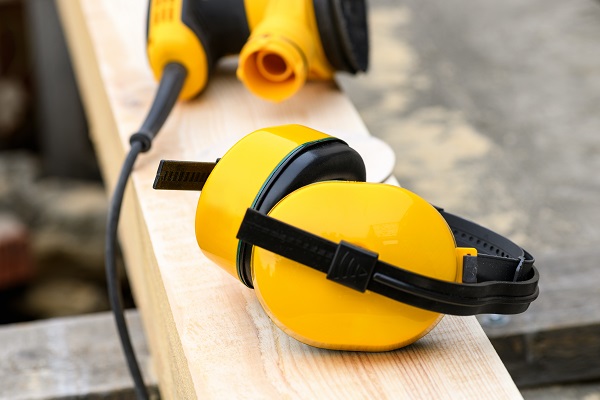Louder for the people in the back: Noise-related injuries in the construction industry
More than 1.1 million workers in Australia are exposed to harmful levels of noise in the workplace. Sean Carroll finds out how the building and construction industry is impacted.
The sectors with the highest rate of worker compensation claims due to occupational hearing loss are construction and manufacturing according to data from Safe Work Australia. Dubbed noise-induced hearing loss, tradies are at risk due to the loud machinery they work with on a day-to-day basis.
ADVERTISEMENT
But just because the industry has a lot of loud machines, it doesn’t mean that tradies are destined to have hearing problems. There is adequate PPE out there to protect workers and regular hearing check-ups are a great way to stay on top of your hearing health.
Audiologist and clinical trainer with Audika Australia, Lauren McNee, says that she has seen several tradies come into her office with a laissez-faire attitude toward hearing protection.
“The reality is, our ears just can’t put up with so much noise and it can lead to hearing difficulties or even hearing loss,” Lauren says.
“Hearing loss can also be very isolating and can lead to loneliness, mental health issues and a reduced quality of life.”
Additionally, it’s estimated that more than half a million Australian workers are experiencing constant tinnitus according to an article published in the Medical Journal of Australia.
Workers live with hearing loss long after they’ve put down the tools so it’s important to think about this issue now. Lauren believes that tradies are experiencing noise-induced hearing loss mainly because they’re not taking the appropriate steps to protect themselves.
The way safe sound levels are measured is logarithmic, meaning it starts with 85dB being safe for up to eight hours and the time is cut drastically with each increase in sound (see Table 1). A good rule of thumb is that if you have to raise your voice to understand the conversation, it’s probably too loud.
| Table 1 Equivalent noise exposures
LAeq,8h = 85 dB(A) |
|
| Noise Level dB(A) | Exposure Time |
| 80 | 16 hours |
| 82 | 12 hours |
| 85 | 8 hours |
| 88 | 4 hours |
| 91 | 2 hours |
| 94 | 1 hour |
| 97 | 30 minutes |
| 100 | 15 minutes |
| 103 | 7.5 minutes |
| 106 | 3.8 minutes |
| 109 | 1.9 minutes |
| 112 | 57 seconds |
| 115 | 28.8 seconds |
| 118 | 14.4 seconds |
| 121 | 7.2 seconds |
| 124 | 3.6 seconds |
| 127 | 1.8 seconds |
| 130 | 0.9 seconds |
(data via Safe Work Australia)
“The first thing I’d say to someone is, if it’s possible, just move away from the course of the noise. This doesn’t mean put down the tools, but if you’re an apprentice, you don’t need to watch the tiler cut every tile,” Lauren explains.
“Additionally, put up signposts for very noisy machinery, letting people know it’s best to avoid and encouraging as many rest breaks as possible so the length of time exposed to a sound is reduced.”
On top of cutting down on exposure, tradies need to ensure they’re wearing the right safety gear. While there’s no blanket rule for the level of protection needed, there are recommendations for the different kinds of equipment and different levels, but Lauren does add that Apple AirPods don’t pass any standards and aren’t a suitable replacement.
“It’s just a case of awareness. You wouldn’t wear thongs to a building site, you wouldn’t go to a demolition without a hard hat. So why are we not putting on hearing protection to do a noisy task,” Lauren adds.
“And sometimes you hear the excuse ‘I’m just cutting one tree’ or ‘I’ll just do it quickly’ but we know that doing several quick tasks across the day adds up. At the end of the day, the PPE doesn’t work if it’s in the boot.”
If you’re concerned about your hearing, Lauren says that Audika has free hearing check-ups which can be done from the comfort of your own home.
“You get your teeth checked, your skin checked, your eyes and so on, but it’s just as important to check up on your hearing,” she says.
“Also, it’s good to keep an eye out for warning signs. If you’re turning the TV or music up louder than you previously had to, if you’re struggling to hear others in group settings, if you need to focus a lot to hear one person, then it’s a good idea to get your hearing checked.”
If only for peace of mind, a hearing check will help tradies understand if their hearing is a concern and can then decide to speak to someone about it.
“The discussion needs to change so that hearing becomes a more important part of the tradie’s life. Just like sunscreen in summer or wearing masks during COVID, we need to encourage people to wear the right PPE because hearing loss down the track isn’t worth it.”
-
ADVERTISEMENT
-
ADVERTISEMENT


